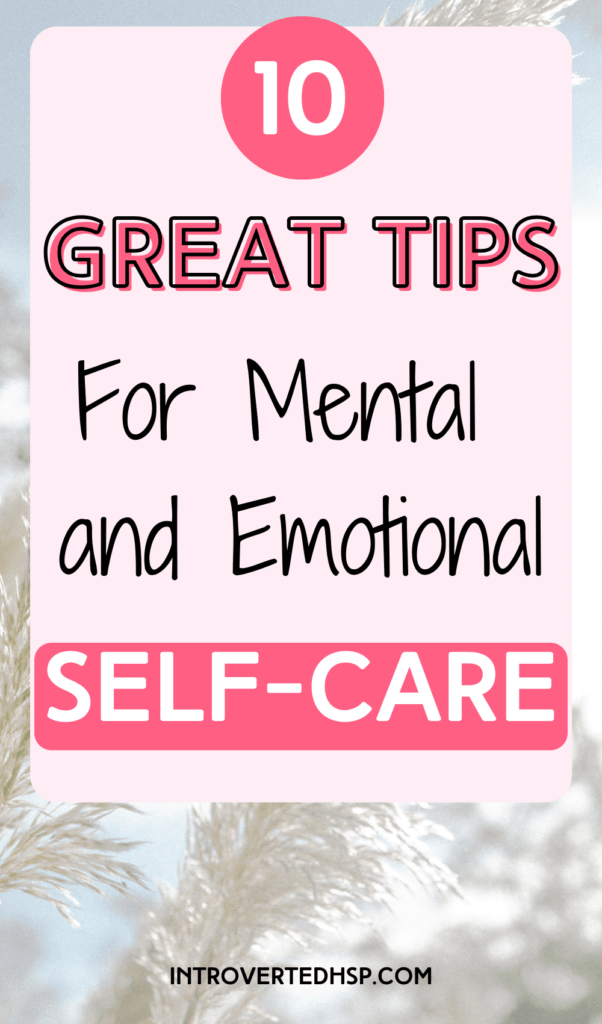Taking care of yourself shouldn’t be hard to do. But it might be more of a struggle when you are feeling down and when you are not feeling good enough to do your everyday self-care routine. Mental and emotional self-care are so important for your overall well-being!
There exist many different types of self-care. In this blog post, I want to talk more about the mental and emotional aspects of self-care. Your emotions are a part of your day-to-day life and your thoughts are with you every minute of every day.
I want to help you, by giving you these 10 tips for better mental health and emotional self-care, so you can become the best and happiest version of yourself.

This post may contain affiliate links, which means if you make a purchase through these links, I may receive a small commission at no extra cost to you. As an Amazon Associate I earn from qualifying purchases. Please read my disclosure for more info.
10 Great Tips For Mental and Emotional Self-Care
1. Journal

Journaling is a way to put your thoughts on paper and clear your mind. When you dump all your thoughts on paper, you will create more space and are more able to relax and be brain-fog-free. This is just the beginning of journaling, writing everything down that’s on your mind, it doesn’t get easier than this.
When you put your thoughts on paper, you can see them more clearly and look at them more rationally than when they are all wandering around in your head. Your thoughts can repeat themselves over and over without even being true, but you will start to believe them if you repeat them enough.
Stop the process of overthinking with journaling every day. Pick out a nice-looking journal to fill it with your thoughts and emotions. You can carry it with you to write something down when you need to or just journal at the same time every morning or evening.
Sometimes you just need to vent and if there are no people around to vent to, you can do this in your journal. This is a great practice to help with your mental and emotional self-care.
2. Challenge Your Negative Thoughts
When you have jotted every thought you have down in your journal or on a piece of paper, the real work starts. Try to look at all the thoughts you are having from a rational perspective. The feelings you have are always true to you because you feel what you feel. But thoughts can be full of lies!
Having negative thoughts can and will influence your feelings. I said that your feelings are always true, so we have to look at the thoughts that are causing you to feel sad and insecure to be able to change this.
Start asking questions about your negative thoughts. Are these thoughts true? Do you have any evidence to verify those thoughts? Are they facts or things you think? If you don’t have verification or facts to support your negative thoughts, they might not be true.
Challenge your negative thoughts by seeing them for what they are, just thoughts and maybe even lies. Try to let them go or even go a step further and bend the thought more positively. This is a form of emotional self-care.
Let me give you an example
‘I feel horrible because I think nobody at work likes me.’
Okay so is this thought true? Did somebody say this to you? Why do you think this way? Maybe nobody spoke to you today or somebody said something mean.
Think about reasons why nobody spoke to you or why that person said something mean in a more positive way that doesn’t make you feel like a bad person. Maybe everybody was super tired and didn’t feel like talking at all, maybe they had a lot of work and wanted to focus on doing some great work today, or maybe the person who said something mean was going through a stressful personal situation and worked it out on you.
Most of the time when people are mean to you, it says more about them and how they are feeling than it does about you. Keep this in mind!
3. Positive Affirmations

Emotional self-care is taking care of and listening to your emotions. You should embrace feeling all your emotions but in reality, everyone wants to feel happy and content most of the time.
Positive affirmations can help you focus more on the positives than the negatives in life. You can create your own positive affirmations or look for inspiration on the internet. There are tons of great examples out there. You might also want to get these positive affirmation cards to give you some more inspiration.
Let me give you a few examples of positive affirmations. I am strong, I am resilient, I am smart, I am capable, I am powerful, I am amazing… You should adapt them to your personal situation to have the best effect for you.
Think about the things you want to be and then affirm those to yourself every day like they are already true. In the beginning, you might not believe them and that’s okay. Just keep practicing and repeating them every single day and eventually, your brain will start to believe them to be true.
You can say these affirmations to yourself in a mirror or just read them out loud. You could also do it in your head, but this is less powerful than when you hear yourself say it.
4. Choose Your People
This tip could also go on a social self-care list but it’s emotional self-care as well if you ask me.
Choose the people you spend your time with carefully. The people you spend most of your time with can change you, therefore it is important to choose them wisely! Find people who you connect with and who will support you when you need it.
When you are friends with people who bring you down more than they lift you, you should end your friendship with them. I know it’s hard, ending relationships and friendships but you need to do this if they impact you negatively all the time!
You should gain energy from spending time with friends and family. It should be fun most of the time. Of course, there will be moments when it’s not all fun and games but the positives should have the upper hand.
And then there is family. You can’t choose your family but you can choose who you spend more or less time with. And if this is not the case, like when you still live at home, the next tip about setting boundaries is a really good one!
A great family and friends are so important for your emotional self-care and your mental well-being!
5. Set Boundaries

Protect yourself and your feelings by setting clear boundaries. Emotional self-care without setting boundaries wouldn’t work efficiently.
Before you can set your boundaries, you should know your boundaries. And how will you discover your boundaries? Pay attention to things that make you feel very uncomfortable or totally overwhelmed.
You can set boundaries with your family and friends, but also with strangers or at work.
Setting boundaries can be doing things like walking away from a conversation when you are insulted without an apology. Saying no to things you don’t want to do without having to explain yourself. Taking time for yourself and eating alone at lunch to recharge your energy for the rest of the day. Letting people know when you don’t like their behavior and feel uncomfortable. The list is endless!
Boundaries are very personal and you really should listen to yourself to figure them out. Be brave and assertive and speak up to protect your emotional and mental health.
6. Practice Mindfulness
Mindfulness is a pretty broad term for all things where you focus your attention on a specific thing or task for some time. You have to only think about the thing that you are doing instead of running a to-do list through your mind whilst cooking or cleaning for example.
With mindfulness, there is no space for worrying and rumination as it focuses only on the present moment, not the past or the future. This can be very freeing!
When you are an overthinker, you would benefit from some mindfulness practice as a form of emotional self-care. There are so many different options on how to include mindfulness in your everyday life.
It’s important to only be doing one time at a time. You can eat mindfully by focusing on the food, the taste, the texture, the smell, and only the food. When you are watching a TV show while eating, you are not practicing mindfulness. You could do some breathing exercises and focus on your breath going in and out of your body.
Because we are often multitasking in the modern world, and we are not made to do that, it’s good to focus on one thing at a time if you can. You will feel better and keep your energy levels higher than when you are combining everything.
7. Learn to Let Go

Let it go, Let it go! Easier said than done Elsa. It is not easy but something you should learn to do if you want to feel more at peace.
If you want to move on with your life or even just your day, you need to let things go. I think journaling is one good way to let things go by writing them down and emptying your mind.
You could also let things go by finding a distraction from the things that have been bothering you, this can help you temporarily but sometimes it will help you to let them go completely. Even better is finding a solution to the things that are bothering you!
When you did something terrible and can’t stop thinking about it, go apologize and try to fix it. If you did all you could to change it for the better, learn to accept it and leave it in the past where it belongs.
If someone else did something to you, try to have a conversation about this with this person and see if you can get them to apologize or explain their point of view. It’s never fun to be angry or upset with someone so try to make amends when you can.
Perfectionists can even hold onto the littlest things that went wrong and this can ruin their day and subsequently their life. With journaling you might see that these things are not that significant and you shouldn’t hold on to these negative feelings about them. Let it go! You will feel so much lighter.
8. Practice Gratitude
Learn to be more grateful for everything in life by practicing gratitude more often. This is also emotional self-care because when you feel grateful, you will feel better.
You could keep a gratitude journal, where you write 3 or 5 things down every morning or evening for the present day that you feel grateful for. This can be difficult if you are wearing dark-colored glasses, but go for it and see if you can find a few things.
The things you write down in your gratitude journal don’t have to be big, they could be something small like a warm cup of coffee, a ray of sunshine, seeing your dog, a person who smiled at you, etc.
You could also share a moment of gratitude with your family or coworkers during mealtime. This can be a good opportunity to connect with them as well.
When you practice gratitude every single day, you will become better at it and you will notice that you will find more things to be grateful for! Isn’t that amazing?
9. Have a Good Cry

Sometimes, all you need to feel better is a good cry or to scream all your frustrations into a pillow or from the top of a roof!
Allow yourself to feel bad and let the tears out. Crying all day obviously won’t make you feel good but when you cry for a moment, most of the time you will feel better afterwards.
When you let yourself cry, you can release stress and emotions that have been building up throughout the day or week and finally relax. It can be healing if you don’t make yourself feel bad for crying.
Everyone cries. Some people are more emotional than others and that is okay, don’t make yourself feel bad for letting your emotions be what they are. When you keep fighting them, you will build up tension and you don’t want that.
Find a safe space and have a good cry now and then.
10. Talk to a Therapist
If all of the tips I mentioned above for mental and emotional self-care don’t do enough for you, try seeing a therapist.
Mental health professionals can help you process your emotions and thoughts and give you practical advice. I did see a therapist in the past and he gave me great advice and alternative perspectives that I was unable to see on my own.
Your loved ones want to help you, but they aren’t professionally trained. They don’t know what they are doing and could make things worse although they mean well.
Professional therapy can be great for practicing emotional self-care, but you need to have some kind of connection with your therapist. If you don’t feel it, maybe try to find another one until you find the right fit.
If your financial situation doesn’t allow you to get professional help, you can do all you can with online resources and maybe go to your GP to talk about it with them or get medication prescribed when you need it.
Emotional Self-Care is SO Important!

People can’t be happy all the time, that’s just not in our nature. It is healthy to make space for experiencing all your emotions and just let them be there for a little while.
If you are struggling through life and seeing all the negatives but almost no positives, it might be good to take care of your emotional and mental health. Go see a therapist if you feel like you can’t do this on your own, they are here to help you!
It’s also important to note that when the other types of self-care are not taken care of, you probably also won’t feel like your best self. Physical self-care is also very important to do to feel good. But when you have taken care of your feelings and mental health, it will be easier to do this.
I hope these tips will help you through the rollercoaster of emotions you face on a day-to-day basis and to feel better in general. Sending you a virtual hug!
